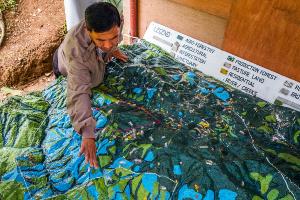USAID’s biodiversity and forest programs conserve natural systems and improve the lives of people who depend on them. USAID partners with governments, communities, and the private sector in 60 countries to conserve threatened landscapes and seascapes while achieving shared economic goals. According to the 2019 Global Assessment Report on Biodiversity and Ecosystem Services, while the world has made great strides in reducing extreme poverty and improving people’s quality of life, the repercussions of global biodiversity loss will affect our development gains and our ability to effectively support partner countries’ economies, global health, security, and capabilities to adapt to a changing climate if left unaddressed.
Through our cross-sectoral programming, USAID works to address the world’s most urgent biodiversity and development needs. By conserving coral reefs and mangroves, improving forest management, and driving innovative technologies, USAID’s conservation activities reduce greenhouse gas emissions and increase carbon storage. These nature-based solutions are building the resilience of people, priority ecosystems, and economies to climate change.
This year, the world experienced firsthand how interconnected humans are with the environment as the COVID-19 virus, a zoonotic disease, decimated global health, food systems, and economies. Many of USAID’s partner countries are the hardest hit by the pandemic: precipitous drops in leisure travel throughout Southern Africa, East Africa, and the Caribbean region have drained crucial tourism revenues from national parks and communities, which, in turn, allow for the increase in the illegal wildlife trade and unsustainable natural resource harvesting. While restricted travel may benefit biodiversity in the short term as human pressures on natural ecosystems are temporarily reduced, many experts believe that the net conservation impacts of COVID-19 will be negative for many areas in Africa, Asia, and Latin America and the Caribbean. This assumption is based on the economic fallout of the pandemic and potential reductions in conservation funding, leading to a decrease in resources to effectively manage conservation areas and increases in poaching, timber harvesting, illegal mining, and agricultural conversion associated with growing rural poverty.
USAID’s conservation programming is essential to ensuring the world’s most vulnerable people can secure their health and well-being while managing and conserving their natural wealth. These investments in managing and conserving healthier, balanced ecosystems build resilience to shocks like COVID-19, strengthening the global community’s ability to build back better and to create a more prosperous and equitable world

